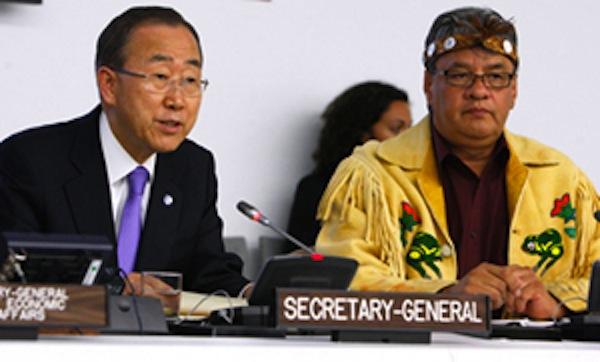It’s International Day of the World’s Indigenous People, as decreed by the United Nations 20 years ago, and First Nations in Canada are taking stock.
This year’s theme is “Bridging the gap: implementing the rights of indigenous peoples,” the UN said in a statement commemorating the August 9 event, occurring during the second consecutive International Decade of the World’s Indigenous People, as decreed by the international body in 2004.
It’s not solely about rights for their own sake, as UN Secretary-General Ban Ki-moon and indigenous leaders pointed out. Indigenous Peoples can be “powerful agents of progress,” Ban Ki-moon said in a statement commemorating the occasion.
“In order for them to contribute to our common future, we must secure their rights,” Ban Ki-moon said. “Let us recognize and celebrate the valuable and distinctive identities of indigenous peoples around the world. Let us work even harder to empower them and support their aspirations.”
The UN counts an estimated 370 million indigenous people in about 90 countries, constituting “15 percent of the world’s poor and about one third of the world’s 900 million extremely poor rural people,” the international body said. “Practicing unique traditions, they retain social, cultural, economic and political characteristics distinct from those of the dominant societies in which they live.”
Back on Turtle Island the call was reiterated and rebroadcast, with renewed exhortations to uphold the treaties.
“The International Day of the World’s Indigenous Peoples is a time to celebrate the strength, resilience and resurgence of Indigenous peoples and nations around the globe,” said Assembly of First Nations National Chief Ghislain Picard. “At the same time, it is an opportunity to reflect on this year’s theme—‘Bridging the gap: implementing the rights of Indigenous peoples’—and the long-overdue and necessary work that we still must do here in Canada to give life to First Nations rights, Treaties and title. This year marks the 250th anniversary of the Treaty of Niagara between Indigenous Nations and Great Britain that reaffirmed our nation-to-nation relationship. This relationship has existed for centuries but we must move now and work together to honor and implement the principles of that relationship.”
Now in particular the notion of bridging the gap is extremely important in Canada, said Federation of Saskatchewan Indian Nations (FSIN) Chief Perry Bellegarde.
“The theme of ‘bridging the gap’ between Canada’s First Nations and non-First Nations people through the implementation of inherent and treaty rights has never been more relevant, or more important, than right now,” said Bellegarde in a statement. “The time for rhetoric and assurances of future actions by the Government of Canada has come to a close. It’s time for concrete steps that will positively impact the day-to-day lives of all First Nations people in Canada – in their homes, at their jobs and with their families.”
He also noted that within Canada, First Nations are rated 63rd in the UN Human Development Index when their collective statistics are assessed—even as the country as a whole ranks sixth.
“This is concrete evidence of the gap in living standards in Canada,” Bellegarde said. “It’s also sad commentary that a country with Canada’s economic strength would allow this to continue.”
The Chiefs of Ontario said the lack of a national inquiry into unsolved murders and disappearances of nearly 1,200 indigenous women over the past few decades was another indication of the gap.
“Unfortunately, the UN Declaration on the Rights of Indigenous Rights is constantly being undermined here in Canada with the ongoing attack on First Nation rights,” said Regional Chief Stan Beardy of the Chiefs of Ontario, in a separate statement. “Internationally, Canada has been criticized for its human rights record and in particular its rejection of the UN call for a review of violence against aboriginal women.”
As of Saturday morning, Prime Minister Stephen Harper had not commemorated International Day of the World’s Indigenous Peoples, though he had released a statement noting it was National Peacekeepers Day in Canada.
“Today we celebrate Canada’s long and proud tradition of contributing to international security,” Harper said in his statement. “Since the mid-1950s, Canada has participated in dozens of international security missions around the world, helping to prevent or contain conflicts and contributing to global and regional stability.”
John Ashe, president of the UN General Assembly, said relegating Indigenous Peoples to the fringes was still a prevalent practice worldwide.
“The historical marginalization of indigenous peoples is still an unfortunate reality in today’s world and in many places, daunting obstacles are a part of daily life,” Ashe said in a statement. “There is still a long way to go in the journey towards the concerted and decisive action.”
Read more at http://indiancountrytodaymedianetwork.com/2014/08/09/its-time-bridge-gap-between-indigenous-peoples-and-countries-un-says-156323

